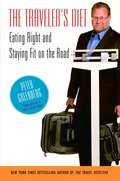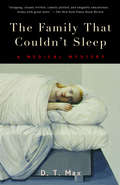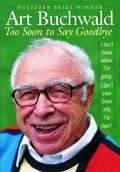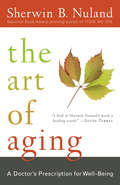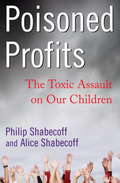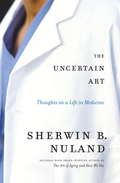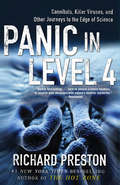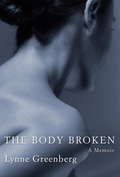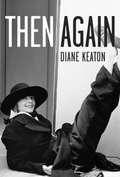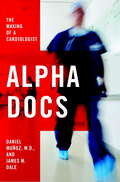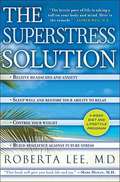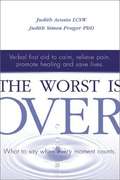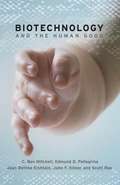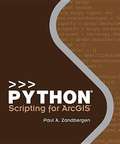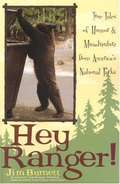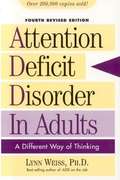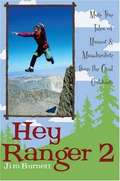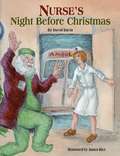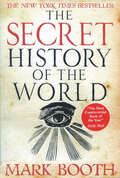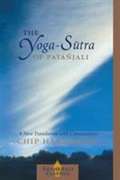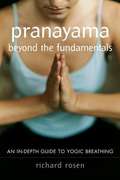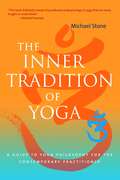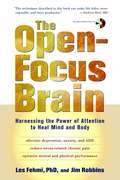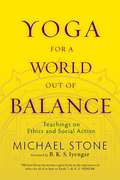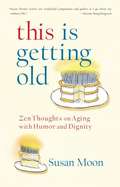- Table View
- List View
The Traveler's Diet: Eating Right and Staying Fit on the Road
by Peter GreenbergExpand your travel horizons without expanding your waistlineNo matter how healthy or balanced your diet, the minute you start traveling, all bets are off. And Peter Greenberg should know. After two decades as a television correspondent (logging an average of 400,000 air miles a year), this frequent flier finally stepped on the scale and then vowed to lose seventy pounds. Now, after sharing insider secrets on hotels, airlines, and cruise ships, he tells you the secret of diet, exercise, sleep, and losing weight while on the road. Each component of the travel process is examined; the results will surprise you and help you to learn: • What new time zones do–and don’t do–to your metabolism• Which airports have the best/worst food. • What to eat before flying• The real truth about how much water to drink–and what kind• How to work out in flight, without turbulence• The “healthy choice” hotel menus that lie• When to sleep and when to stay awake–some real surprises.• How to turn your hotel room into an instant gym• How to stay in ship-shape while actually at sea.• Eat well without overdoing it–even in France and Italy• How to create healthy structure with an unstructured scheduleTogether with medical, fitness, nutrition experts, and aeromedicine and exercise physiology consultants, Peter Greenberg provides a practical plan that works for road warriors and leisure travelers alike. Whether you’re jetting off to Mumbai or Memphis, this entertaining guide ensures that you arrive at your destination in style and in shape.
The Family That Couldn't Sleep: A Medical Mystery
by D. T. MaxFor two hundred years a noble Venetian family has suffered from an inherited disease that strikes their members in middle age, stealing their sleep, eating holes in their brains, and ending their lives in a matter of months. In Papua New Guinea, a primitive tribe is nearly obliterated by a sickness whose chief symptom is uncontrollable laughter. Across Europe, millions of sheep rub their fleeces raw before collapsing. In England, cows attack their owners in the milking parlors, while in the American West, thousands of deer starve to death in fields full of grass. What these strange conditions–including fatal familial insomnia, kuru, scrapie, and mad cow disease–share is their cause: prions. Prions are ordinary proteins that sometimes go wrong, resulting in neurological illnesses that are always fatal. Even more mysterious and frightening, prions are almost impossible to destroy because they are not alive and have no DNA–and the diseases they bring are now spreading around the world. In The Family That Couldn’t Sleep, essayist and journalist D. T. Max tells the spellbinding story of the prion’s hidden past and deadly future. Through exclusive interviews and original archival research, Max explains this story’s connection to human greed and ambition–from the Prussian chemist Justus von Liebig, who made cattle meatier by feeding them the flesh of other cows, to New Guinean natives whose custom of eating the brains of the dead nearly wiped them out. The biologists who have investigated these afflictions are just as extraordinary–for example, Daniel Carleton Gajdusek, a self-described “pedagogic pedophiliac pediatrician” who cracked kuru and won the Nobel Prize, and another Nobel winner, Stanley Prusiner, a driven, feared self-promoter who identified the key protein that revolutionized prion study. With remarkable precision, grace, and sympathy, Max–who himself suffers from an inherited neurological illness–explores maladies that have tormented humanity for centuries and gives reason to hope that someday cures will be found. And he eloquently demonstrates that in our relationship to nature and these ailments, we have been our own worst enemy.
Too Soon to Say Goodbye (Thorndike Biography Ser.)
by Art BuchwaldWhen doctors told Art Buchwald that his kidneys were kaput, the renowned humorist declined dialysis and checked into a Washington, D.C., hospice to live out his final days. Months later, "The Man Who Wouldn't Die" was still there, feeling good, holding court in a nonstop "salon" for his family and dozens of famous friends, and confronting things you usually don't talk about before you die; he even jokes about them. Here Buchwald shares not only his remarkable experience--as dozens of old pals from Ethel Kennedy to John Glenn to the Queen of Swaziland join the party--but also his whole wonderful life: his first love, an early brush with death in a foxhole on Eniwetok Atoll, his fourteen champagne years in Paris, fame as a columnist syndicated in hundreds of newspapers, and his incarnation as hospice superstar. Buchwald also shares his sorrows: coping with an absent mother, childhood in a foster home, and separation from his wife, Ann. He plans his funeral (with a priest, a rabbi, and Billy Graham, to cover all the bases) and strategizes how to land a big obituary in The New York Times ("Make sure no head of state or Nobel Prize winner dies on the same day"). He describes how he and a few of his famous friends finagled cut-rate burial plots on Martha's Vineyard and how he acquired a Picasso drawing without really trying. What we have here is a national treasure, the complete Buchwald, uncertain of where the next days or weeks may take him but unfazed by the inevitable, living life to the fullest, with frankness, dignity, and humor. "[Art Buchwald] has given his friends, their families, and his audiences so many laughs and so much joy through the years that that alone would be an enduring legacy. But Art has never been just about the quick laugh. His humor is a road map to essential truths and insights that might otherwise have eluded us." -Tom Brokaw.
The Art of Aging: A Doctor's Prescription for Well-Being
by Sherwin B. NulandDr. Nuland steps back to explore the impact of aging on our minds and bodies, strivings and relationships. Melding a scientist's passion for truth with a humanist's understanding of the heart and soul, Nuland has created a wise, frank, and inspiring book about the ultimate stage of life's journey. The onset of aging can be so gradual that we are often surprised to find that one day it is fully upon us. The changes to the senses, appearance, reflexes, physical endurance, and sexual appetites are undeniable-and rarely welcome-and yet, as Nuland shows, getting older has its surprising blessings. Age concentrates not only the mind, but the body's energies, leading many to new sources of creativity, perception, and spiritual intensity. Growing old, Nuland teaches us, is not a disease but an art-and for those who practice it well, it can bring extraordinary rewards. "I'm taking the journey even while I describe it," writes Nuland, now in his mid-seventies and a veteran of nearly four decades of medical practice. Drawing on his own life and work, as well as the lives of friends both famous and not, Nuland portrays the astonishing variability of the aging experience. Faith and inner strength, the deepening of personal relationships, the realization that career does not define identity, the acceptance that some goals will remain unaccomplished-these are among the secrets of those who age well. Will scientists one day fulfill the dream of eternal youth? Nuland examines the latest research into extending life and the scientists who are pursuing it. But ultimately, what compels him most is what happens to the mind and spirit as life reaches its culminating decades. Reflecting the wisdom of a long lifetime, The Art of Aging is a work of luminous insight, unflinching candor, and profound compassion.
Poisoned Profits
by Philip Shabecoff Alice ShabecoffIn this shocking and sobering book, two fearless journalists directly and definitively link industrial toxins to the current rise in childhood disease and death. In the tradition of Silent Spring,Poisoned Profitsis a landmark investigation, an eye-opening account of a country that prizes money over children’s health. With indisputable data, Philip Shabecoff and Alice Shabecoff reveal that the children of baby boomers–the first to be raised in a truly “toxified” world–have higher rates of birth defects, asthma, cancer, autism, and other serious illnesses than previous generations. In piercing case histories, the authors identify the culprit as corporate pollution. Here are the stories of such places as Dickson, Tennessee, where babies were born with cleft lips and palates after landfill chemicals seeped into the water, and Port Neches, Texas, where so many graduates of a high school near synthetic rubber and chemical plants contracted cancer that the school was nicknamed “Leukemia High. ” The danger to our children isn’t just in the outside world, though. The Shabecoffs provide evidence that our homes are now infested with everything from dangerous flame retardants in crib mattresses to harmful plastic softeners in teething rings to antibiotics and arsenic in chicken–additives that are absorbed by growing and physically vulnerable kids as well as by pregnant women. Compounding the problem are chemical corporations that sabotage investigations and regulations, a government that refuses to police these companies, and corporate-hired scientists who keep pertinent secrets massaged with skewed data of their own. Poisoned Profitsalso demonstrates how people are fighting back, whether through grassroots parents’ groups putting pressure on politicians, the rise of “ecotheology” in the pulpits of formerly indifferent churches, or the new “green chemistry” being practiced in labs to replace bad elements with good. The Shabecoffs also include helpful tips on reducing risks to children in how they eat and play, and in how parents clean and maintain their homes. Powerful, unflinching, and eminently readable,Poisoned Profitsis a wake-up call that is bound to inspire talk and force change. From the Hardcover edition.
The Uncertain Art: Thoughts on a Life in Medicine
by Sherwin B. Nuland"Life is short, and the Art so long; the occasion fleeting; experience fallacious; and judgment difficult. The physician must not only be prepared to do what is right himself, but also to make the patient, the attendants, and the externals, cooperate."-attributed to Hippocrates, c. 400 B.C.E. The award-winning author of How We Die and The Art of Aging, venerated physician Sherwin B. Nuland has now written his most thoughtful and engaging book. The Uncertain Art is a superb collection of essays about the vital mix of expertise, intuition, sound judgment, and pure chance that plays a part in a doctor's practice and life. Drawing from history, the recent past, and his own life, Nuland weaves a tapestry of compelling stories in which doctors have had to make decisions in the face of uncertainty. Topics include the primitive (and sometimes illegal) procedures doctors once practiced with good intentions, such as grave robbing and prescribing cocaine as an anesthetic (which resulted in a physician becoming America's first cocaine addict); the curious "cures" for irregularity touted by people from the ancient Egyptians to the cereal titan John Harvey Kellogg and bodybuilder Charles Atlas; and healers grappling with today's complex moral and ethical quandaries, from cloning to gene therapy to the adoption of Eastern practices like acupuncture. Nuland also recounts his most dramatic experiences in a forty-year medical career: the time he was called out of the audience of a Broadway play to help a man having a heart attack (when no other doctor there would respond), and how he formed a profound friendship with an unforgettable-and doomed-heart patient. Behind these inspiring accounts always lie the mysteries of the human body and human nature, the manner in which the ill can will themselves back to health and the odd and essential interactions between a body's own healing mechanisms and a doctor's prescriptions.Riveting and wise, amusing and heartrending, The Uncertain Art is Sherwin Nuland's best work, gems from a man who has spent his professional life acting in the face of ambiguity and sharing what he has learned.
Panic in Level 4: Cannibals, Killer Viruses, and Other Journeys to the Edge of Science
by Richard PrestonPanic in Level 4 is a grand tour through the eerie and unforgettable universe of Richard Preston, filled with incredible characters and mysteries that refuse to leave one's mind. Here are dramatic true stories from this acclaimed and award-winning author, including * the phenomenon of "self-cannibals," who suffer from a rare genetic condition caused by one wrong letter in their DNA that forces them to compulsively chew their own flesh--and why everyone may have a touch of this disease * the search for the unknown host of Ebola virus, an organism hidden somewhere in African rain forests, where the disease finds its way into the human species, causing outbreaks of unparalleled horror * the brilliant Russian brothers--"one mathematician divided between two bodies"--who built a supercomputer in their apartment from mail-order parts in an attempt to find hidden order in the number pi (π). In exhilarating detail, Preston portrays the frightening forces and constructive discoveries that are currently roiling and reordering our world, once again proving himself a master of the nonfiction narrative.
The Body Broken: A Memoir
by Lynne GreenbergIn the tradition of William Styron’s tour de force Darkness Visible, The Body Broken is a gorgeously told and intensely moving account of one woman’s extraordinary odyssey into a life of chronic pain–and of the unyielding resilience of the human spirit.At age nineteen, Lynne Greenberg narrowly survived a devastating car crash. When her broken neck healed–or so everyone thought–her recovery was hailed as a medical miracle and she returned to normal life. Years later, she seemed to have it all: a loving husband, two wonderful children, a peaceful home, and a richly satisfying job as a tenured poetry professor. Then, one morning, this blissful façade shattered–the pain in her neck returned in the most vicious way. A life with physical agony ensued.Greenberg realized that she had been living for years on borrowed time. As she and her family navigated an increasingly complicated web of doctors and specialists, Greenberg taught herself to fight her own battles–against a medical system ill-equipped to handle patients with chronic pain, and against the emotional pitfalls of a newly restricted life. Drawing on her family’s support, her own indomitable spirit, and an intense connection to the poetry she taught, Greenberg found the strength to return to a productive and satisfying–if irrevocably changed–life. This deeply personal saga takes us to the heart of a family’s struggle to survive a crisis, and shows us how, at the most profound levels, such an odyssey affects a patient’s marriage, the ability to parent, family, work, and friendships.The Body Broken is a powerful, lyrical story of one woman’s remarkable determination and breathtaking courage, as she puts mind over matter in the struggle to reclaim her life.
Then Again
by Diane Keaton"Mom loved adages, quotes, slogans. There were always little reminders pasted on the kitchen wall. For example, the word THINK. I found THINK thumbtacked on a bulletin board in her darkroom. I saw it Scotch-taped on a pencil box she'd collaged. I even found a pamphlet titled THINK on her bedside table. Mom liked to THINK." So begins Diane Keaton's unforgettable memoir about her mother and herself. In it you will meet the woman known to tens of millions as Annie Hall, but you will also meet, and fall in love with, her mother, the loving, complicated, always-thinking Dorothy Hall. To write about herself, Diane realized she had to write about her mother, too, and how their bond came to define both their lives. In a remarkable act of creation, Diane not only reveals herself to us, she also lets us meet in intimate detail her mother. Over the course of her life, Dorothy kept eighty-five journals--literally thousands of pages--in which she wrote about her marriage, her children, and, most probingly, herself. Dorothy also recorded memorable stories about Diane's grandparents. Diane has sorted through these pages to paint an unflinching portrait of her mother--a woman restless with intellectual and creative energy, struggling to find an outlet for her talents--as well as her entire family, recounting a story that spans four generations and nearly a hundred years. More than the autobiography of a legendary actress, Then Again is a book about a very American family with very American dreams. Diane will remind you of yourself, and her bonds with her family will remind you of your own relationships with those you love the most.
Alpha Docs
by Daniel Muñoz James M. DaleIn the tradition of Scott Turow's One L and Atul Gawande's Better comes a real-time, real-life chronicle from an impassioned young doctor on the front lines of high-stakes cardiology. It takes drive, persistence, and plenty of stamina to practice cardiology at the highest level. The competition for training fellowship spots is intense. Hundreds of applicants from all over the world compete to be accepted into the Cardiovascular Disease Training Fellowship at Johns Hopkins. Only nine are chosen each year. This is the story of one of those fellows. In Alpha Docs, Daniel Muñoz, M.D., recounts his transformation from wide-eyed young medical student to caring, empathetic professional--providing a rare inside look into the day-to-day operations of one of the world's most prestigious medical institutions. The training is arduous and often unforgiving, as Muñoz and his colleagues are schooled by a staff of brilliant and demanding physicians. How they learn the art and science of untangling cardiac mysteries, how they live up to the standards of an iconic institution, how they survive the pressures and relentlessly push themselves to reach the top ranks of American medicine, supplies the beating heart of this gripping narrative. Readers accompany Muñoz as he interacts with his mentors, diagnoses and treats patients, counsels worried family members, and struggles to stay awake for days and nights on end. Lives are saved--and sometimes lost. But the rewards are immediate and the incentives powerful. As Muñoz confides after helping to rescue one man from the throes of a heart attack: "I knew where I wanted to be: not watching but doing, on the side of the glass where I can help shape a patient's fate. I would be a cardiologist." A unique yet universal story about striving to be the best in a high-risk, high-impact field, Alpha Docs provides fresh perspective on the state of America's healthcare system as it captures all the fulfillment and frustrations of life as a doctor in the twenty-first century.From the Hardcover edition.
The SuperStress Solution: 4-week Diet and Lifestyle Program
by Roberta Lee M.D.We live on little sleep and exercise but a lot of work. We eat junk and processed foods on the run and fuel up with caffeine and sugar. We are chronically overcommitted, subjected to a 24/7 news cycle, and can’t take our eyes off our computers and PDAs. Is it any wonder that anxious is the new normal?Our bodies are hardwired to cope with stress, but we are biologically ill-equipped to handle the kind that we endure today. The human brain, in all its majesty, can’t distinguish true physical emergencies from daily hassles, deadlines, information overload, difficult decisions, guilt, and worries. The physiological reaction is the same: a chronic hormonal surge born of our instinctive fight-or-flight response. The result is a cluster of dangerous symptoms: immune deficiencies, high blood pressure, weight gain, insomnia, and a wide range of other ailments. This is what world-renowned integrative physician Dr. Roberta Lee has defined as the SuperStress syndrome, which is caused by our overstimulated, undernourished lifestyle. In this empowering, life-changing book, Dr. Lee presents the solution to SuperStress. She shows how you can build stress resistance and resilience into your life with a unique prescription for recognizing, rebalancing, and protecting against stresses small and large. Starting with a comprehensive, informative questionnaire to determine your stress level and stress personality type, The SuperStress Solution then guides you through a 4-week healing program to reset your rattled nervous system to a default state of rest rather than high alert. Discover how to• Nourish your body with nutrient-rich foods, herbs, and supplements that repair stress damage• Detox your system and jump-start your body’s healing with an easy-to-follow eating plan• Sleep well again by following simple steps to protect and promote the rest your body needs• Move to simple, low-impact exercises that can be done in five-minute to one-hour increments• Retrain your mind so you can access a sense of peace and calm even in your most stressed-out momentsThe SuperStress Solution will do more than help you beat back the overload that is making you sick; it will restore physical harmony and balance. More than a program that makes you feel better, it is a program that will make you truly well.
The Worst Is Over: What to Say When Every Moment Counts
by Judith Acosta Judith Simon PraegerA detailed explanation of the Verbal First Aid used to calm people, relieve pain, promote healing, and save lives
Biotechnology and the Human Good
by Jean Bethke Elshtain Scott B. Rae C. Ben Mitchell Edmund D. Pellegrino John F. KilnerSome of humankind's greatest tools have been forged in the research laboratory. Who could argue that medical advances like antibiotics, blood transfusions, and pacemakers have not improved the quality of people's lives? But with each new technological breakthrough there comes an array of consequences, at once predicted and unpredictable, beneficial and hazardous. Outcry over recent developments in the reproductive and genetic sciences has revealed deep fissures in society's perception of biotechnical progress. Many are concerned that reckless technological development, driven by consumerist impulses and greedy entrepreneurialism, has the potential to radically shift the human condition -- and not for the greater good. Biotechnology and the Human Good builds a case for a stewardship deeply rooted in Judeo-Christian theism to responsibly interpret and assess new technologies in a way that answers this concern. The authors jointly recognize humans not as autonomous beings but as ones accountable to each other, to the world they live in, and to God. They argue that to question and critique how fields like cybernetics, nanotechnology, and genetics might affect our future is not anti-science, anti-industry, or anti-progress, but rather a way to promote human flourishing, common sense, and good stewardship. A synthetic work drawing on the thought of a physician, ethicists, and a theologian, Biotechnology and the Human Good reminds us that although technology is a powerful and often awe-inspiring tool, it is what lies in the heart and soul of who wields this tool that truly makes the difference in our world.
Python Scripting For ArcGIS
by Paul A. ZandbergenThis book is a guide for experienced users of ArcGIS® Desktop to get started with Python scripting without needing previous programming experience. Experience with other scripting or programming languages (Perl, VBA, VB script, Java, C++) is helpful but not required. Readers are expected to have good general ArcGIS skills and a basic understanding of geoprocessing procedures.
Hey Ranger!: True Tales of Humor and Misadventure from America's National Parks
by Jim BurnettIn his thirty years with the National Park Service, Jim Burnett has seen it all: boat ramp mishaps that have sent cars into the water; skunks in the outhouse and bears at the dumpster; visitors looking for the bridge over the Grand Canyon.
Attention Deficit Disorder in Adults
by Lynn WeissADD in Adults enjoys steady sales year after year. Since its last revision in 1997, dozens of new treatments and philosophies about ADD and ADHD have met with storms of controversy and great media attention. As we've seen her do time and again, Lynn Weiss cuts through the noise and gets down to the point in a human, caring, and professional way. People turn to the Weiss library for a breath of fresh air on the ADD turmoil. Is it an allergy? A chemical imbalance? A genetic thing? Lynn's answer: "Who cares?" The new edition not only touches on and dispels the most recent clinical findings, it also emphasizes the bigger perspective, focusing on the humanitarian, economic, empowerment, and diversity issues facing all of us on the ADD continuum today.
Hey Ranger 2: More True Tales of Humor and Misadventure from the Great Outdoors
by Jim BurnettIn this sequel to the wildly successful "Hey Ranger: True Tales of Humor and Misadventure from America's National Parks," former ranger Jim Burnett casts his net globally in search of the most outrageous and humorous stories of man in his eternal quest to experience the natural world. Told in Burnett's classic, folksy, conversational style, Hey Ranger 2 will not disappoint as the follow-on to what has become a campground classic.
Nurse's Night Before Christmas
by David Davis"Chart notes were hung on the wall with great care Our work load was heavy and break times were rare When outside the doors I herd such a din I called up the guard to see who'd backed in"
The Secret History of the World
by Mark BoothThis New York Times bestselling work reimagines world history though the belief systems of Freemasons, Rosicrucians, Kabbalists, and others.They say that history is written by the victors. But what if history as we know it written by the wrong people? What if everything we’ve been told is only part of the story? In this groundbreaking and controversial work, Mark Booth embarks on an enthralling tour of our world’s secret histories. Booth starts from a dangerous premise: That the stories put forward by the world’s various cults and mystical traditions are true. From there he relates a deeply provocative alternate history of the past 3,000 years. From Greek and Egyptian mythology to Jewish folklore, from Christian cults to Freemasons, from Charlemagne to Don Quixote, from George Washington to Hitler—Booth shows that history needs a revolutionary rethink, and he has 3,000 years of hidden wisdom to back it up.
The Yoga-sutra of Patañjali: A New Translation with Commentary
by Chip Hartranft PatañjaliIn just 196 short aphorisms, this classic work of Indian philosophy spells out succinctly how the mind works, and how it is possible to use the mind to attain liberation. Compiled in the second or third century CE, the Yoga-Sutra is a road map of human consciousness--and a particularly helpful guide to the mind states one encounters in meditation, yoga, and other spiritual practices. It expresses the truths of the human condition with great eloquence: how we know what we know, why we suffer, and how we can discover the way out of suffering. Chip Hartranft's fresh translation and extensive, lucid commentary bring the text beautifully to life. He also provides useful auxiliary materials, including an afterword on the legacy of the Yoga-Sutra and its relevance for us today.
Pranayama Beyond The Fundamentals: An In-depth Guide To Yogic Breathing
by Richard RosenFor serious students of yoga who have an established pranayama practice, this book is a follow-up to Rosen's previous book, The Yoga of Breath. Here he picks up where he left off, offering a selection of traditional yogic techniques for those who wish to deepen their practice of pranayama and their understanding of the ancient wisdom of yoga. Rosen skillfully puts forward an array of awareness disciplines, breathing practices, mudras, and seals, interspersed with anecdotes and quotes from ancient texts.
The Inner Tradition of Yoga: A Guide to Yoga Philosophy for the Contemporary Practitioner
by Michael Stone Richard FreemanThere is more to the tradition of yoga than toning and strengthening. At the root, there is a vast and intriguing philosophy that teaches the ethics of nonviolence, patience, honesty, and respect. Michael Stone provides an in-depth explanation of ancient Indian yogic philosophy along with teachings on how to bring our understanding of yoga theory to deeper levels through our practice on the mat--and through our relationships with others.
The Open-Focus Brain: Harnessing the Power of Attention to Heal Mind and Body
by Jim Robbins Les FehmiIn this health book, Dr. Les Fehmi a pioneering researcher and clinician teams up with Jim Robbins, an award-winning science writer, to present a disarmingly simple idea: the way we pay attention in daily life plays a critical role in our health and well-being.
Yoga for a World Out of Balance: Teachings on Ethics and Social Action
by Michael StoneUsing the five principles (yama) described in the Yoga-Sutra attributed to Patanjali, Michael Stone offers a basis for rethinking ethical action and the spiritual path.
This Is Getting Old: Zen Thoughts on Aging with Humor and Dignity
by Susan MoonIn this intimate and funny collection of essays on the sometimes confusing, sometimes poignant, sometimes hilarious condition of being a woman over sixty, Susan Moon keeps her sense of humor and she keeps her reader fully engaged. Among the pieces she has included here are an essay on the gratitude she feels for her weakening bones; observations on finding herself both an orphan and a matriarch following the death of her mother; musings on her tendency to regret the past; thoughts on how not to be afraid of loneliness; appreciation for the inner tomboy; and celebratory advice on how to regard "senior moments" as opportunities to be in the here and now.
